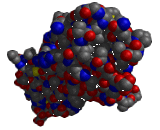Chorionic Gonadotropin (CG)
hCG; Human Chorionic Gonadotrophin

Human chorionic gonadotrophin (hCG) is a glycoprotein hormone produced in pregnancy that is made by the developing embryo soon after conception and later by the syncytiotrophoblast (part of the placenta). Its role is to prevent the disintegration of the corpus luteum of the ovary and thereby maintain progesterone production that is critical for a pregnancy in humans. hCG may have additional functions; for instance, it is thought that hCG affects the immune tolerance of the pregnancy.
Equine chorionic gonadotropin (eCG) is a gonadotropic hormone produced in the chorion of pregnant mares. Most commonly called pregnant mare's serum gonadotropin (PMSG) in the past, the hormone is commonly used in concert with progestogen to induce ovulation in livestock prior to artificial insemination.
